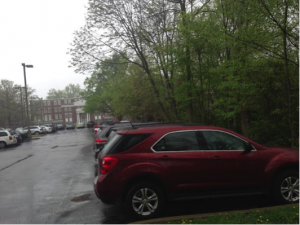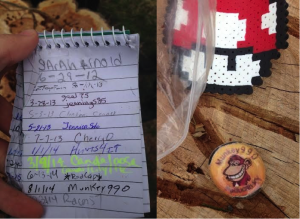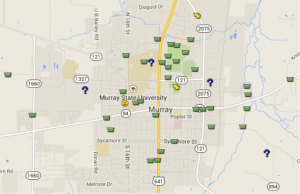By Zach Davis, contributing writer
Geocaches are the best kept secrets hiding all around you. You’re constantly surrounded by them, often walking within feet of them. But then, how could you know?
Secret treasure isn’t supposed to be obvious.
If you’ve never heard of geocaching, here’s the rundown:
- Someone hides a small object (typically in an ink cartridge or tiny canister) somewhere that’s difficult for someone to accidentally find.
- The person marks the object’s coordinates publicly on the Geocaching service, usually with a short description and a hint.
- Other users try to track it down.

If this is news to you, you’ve been missing the most fun new trend in years. Much like the spoils of a good geocache, the act of geocaching seems to be a hidden treasure itself.
Fifteen years ago, May 2, 2000 the U.S. government ended the “Selective Availability” of GPS systems, vastly expanding the accuracy of global positioning for civil and commercial use. A day later, Dave Ulmer, GPS enthusiast and father of geocaching, hid a container in the woods.
He posted the coordinates of the container online and asked anyone who found the container to “Take some stuff, leave some stuff.” And geocaching was born.
For more than a decade, users of geocaching.com played the game in nearly every city in America and across much of the world.
There are treasure hunters among you, whether you’re privy to it or not.
Caches can be hidden anywhere, and the more creative the spot the better: whether it’s magnetized under a fencepost, cradled high up in a tree, or buried under a hidden brick.
The tougher the cache is to find, the more rewarding it is to uncover.
This also prevents non-cachers, also known as “muggles” by the geocaching community, from taking the cache without knowing its purpose.

Once you’ve found a cache, crack it open and see what’s inside. Every cache contains a piece of paper for finders to sign and date and some caches contain even more treasures. It’s not unusual to find old toys, spare change or other oddities inside. The standard etiquette is to take something only if you put something back in, so don’t grab the goodies and run.
But when geocaching, make sure to follow the actual rules as well and confirm with any private property owners that they are okay with the cache being there. The rules are simple: if you take something from the geocache, leave something of equal or greater value for the next hunter. Write about your find in the cache logbook and then log your experience at geocaching.com
In the past, incidents like this one could have been easily prevented by referring to the geocaching rules. The biggest rule of geocaching: don’t be dumb.
The thrill of exploration is what draws many Geocachers to the hobby.
Richie Deason, junior from Wingo, Ky., said geocaching is a great way to get out and find new places that users had no idea about.
“My buddy Trevor and I found an entire trail we never knew existed while we were looking for (a cache),” he said.
Deason said items hidden for geocaching are everywhere.
“My favorite place to go is Noble Park in Paducah,” he said. “It’s so nice, and there’s a bunch of them there.”

There are about 30 geocaches registered in Murray and hundreds more within 30 miles of the city limits.
Eight months ago the United States reported being home to more than a million caches, according to the Geocache Fact Sheet.
Geocaching might not be mainstream, but it’s far from a tiny hobby. More than 6 million users are registered at geocaching.com, and that number grows larger each year.
Free geocaching apps are widely available for iPhones and Androids. Each of the official apps can be used as much as you’d like without paying, but paying for a premium membership ($10 for three months, $30 for a year) allows members to view extra caches that can’t be seen otherwise.
There are still more to find without ever having to pay a cent, and upgrading is just a bonus for those who want to find everything.
Requiring just a smartphone and a perceptive eye, geocaching is an easily accessible diversion that beckons out the adventurer in us all.
When given a chance to turn the familiar world around you into a game, why wouldn’t you decide to play?



























































































